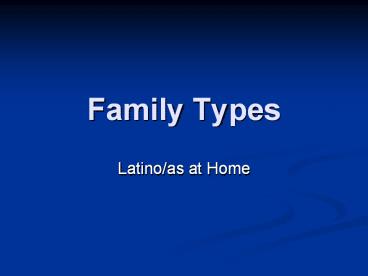Family Types - PowerPoint PPT Presentation
1 / 35
Title: Family Types
1
Family Types
- Latino/as at Home
2
Terminology
3
Authority
- The right to command or act
4
Gentrix
- Biological mother of child.
5
Mater
- Socially recognized mother of the children, but
not necessarily the gentrix.
6
Genitor
- Biological father of child.
7
Pater
- Socially recognized father of child, but not
necessarily the genitor.
8
Lineage
- A corporate group who claim descent from a common
ancestor and can trace genealogy through known
links to that ancestor.
9
Patrilineal Descent
- Decent traced through the male line for purposes
of group membership.
10
Matrilineal Descent
- Decent traced through the female line for
purposes of group membership.
11
Unilineal Descent
- Established kinship exclusively through either
the mother or the fathers line
12
Family
- A complex concept that entail at least the
structure of the kin group, the function of
family/kin members to one another, its
sentimental or emotional dimensions, and its
durability through time.
13
Nuclear Family
- A normally co-residential family unit made up of
a heterosexual couple and their children.
14
Extended Family
- A large household group, related by ties of
descent, marriage, or other durable
relationships. - A set of mutually dependent and obligated kin
that extends beyond the nuclear family.
15
Bilateral Family
- A system in which a person relates to close
relatives on both mother and fathers side.
16
Blended Family
- Families formed through combining the children of
two or more marriages (or other sexual
relationships).
17
Neolocal Resident
- Residence of a couple after marriage in which the
married couple forms a household in an
independent location.
18
Patrilocal Residence
- Residence of a couple after marriage in which the
married couple lives in the locality associated
with the husbands relatives.
19
Matrilocal Residence
- Residence of a couple after marriage in which the
married couple lives in the locality associated
with the wifes relatives
20
Monogamy
- The taking of a single spouse in marriage
21
Serial Monogamy
- The taking of more than one spouse in ones
lifetime, but dissolving one monogamous marriage
before beginning another.
22
Dysfunctional
- Not operating as it should.
- When applied to social relations, they use of
this term assumes that norms, roles, and/or
actions cause relations to not work as they
should.
23
Rights of Passage
- An event which marks important changes in the
status of individuals or age-sets, such as birth,
adulthood, marriage, or death.
24
Family, Marriage and Kinship
- Family formation varies among Latino families.
- Different from undocumented workers than those
born in the U.S.
25
- Embodied within these identities are such
concepts as respeto (respect), especially for
elders, for motherhood, and for male heads. - Also related in this context are ideas of
machismo (masculinity) and responsibility.
26
la casa and la familia
- Household (la casa) is a residential unit with a
varied membership. - It includes people who live together and is the
unit of genetic reproduction, economic
production, sharing and/or consumption.
27
- Family (la familia) is a system of kinship
affiliation, one in which people are related on a
real or fictive kinship basis and distinguished
from non-kin. - Members of la familia may be located in another
country. - Made up of nuclear and extended families
28
Mexican-American Families
- The ease of communication between the U.S. and
Mexico, the economic ties which exist, the
transfer of money and other factors have led to
creation of sub-groups. - This has also changes the Mexican-American family
in many ways.
29
Positive
- The familia has been of great service to new and
old migrants. - Information, monies, cultural events.
30
Negative
- Young people find la familia structure to
structured and hard to conform to American
Standards. - Different standards change the resepto of la
familia roles - Elders or parental roles.
31
- Resources gained through an American nuclear
familia system (individualistic norms) are not
being shared with with the extended familia.
32
Cuban Families
- The strong political and economic status of
Cubans in America has resulted in the
re-enforcement of a strong family unit and
ideology.
33
- The Cuban American household is more likely to
include and extended family. - This means that there is an older relative
present on a full time basis who is significant
in passing on language and traditional cultural
patterns.
34
Dominican Family
- Little as been written on the la familia because
e most are undocumented workers. - As with many Latino familia, Dominican familia
are extended familia systems and friends.
35
- Dominicans send more money home to support
relatives. - Because most men from the republic work in the
U.S. the familia system has changed in their home
country. - Women take on head of household roles.































